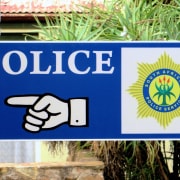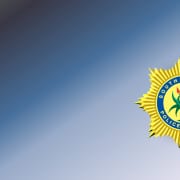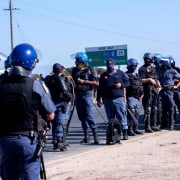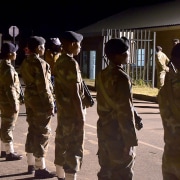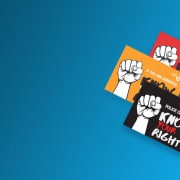|
Getting your Trinity Audio player ready...
|
Image credit: Institute for Security Studies
By Sabeehah Motala and Melusi Ncala
Images of the United States of America burning have dominated headlines these past weeks. The images are seared into our minds, of protest action taking centre stage across the country, and indeed the world, following the killing of George Floyd. Rightfully so, as the death of an unarmed black man is a repeated tragedy in USA, rarely meriting true justice. The rage has been echoed here in South Africa too, social media flooded with empty black squares for #BlackOutTuesday.
But for some reason, the call for justice for those who have died at the hands of the South African Police Service (Saps) has been substantially quieter. In fact, since the beginning of lockdown in South Africa, 11 deaths by police and South African National Defence Force (SANDF) have been recorded. Of those 11, the name that media have focused on most is that of Collins Khosa, allegedly killed by actions of the SANDF, whilst the names of those killed in Saps action remain unknown to most.
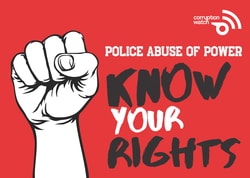
Know your rights when dealing with police – download and share our brochures. https://www.corruptionwatch.org.za/know-your-rights-when-dealing-with-police/
Vague, poorly implemented lockdown regulations have led to accusations of heavy-handedness by security officials and unnecessary arrests. South African police have arrested more than 230 000 people, more than any other country in the world. These allegations are reflected in the Independent Police Investigative Directorate’s (Ipid) recent report to the parliamentary Portfolio Committee on Police (PCP). The report details complaints made to Ipid in terms of its mandate to investigate incidents of wrongdoing by police officers, including deaths as a result of police actions or in custody, rapes by police officers, or alleged assault by police officers.
Of the 828 cases reported to Ipid between 26 March and 5 May 2020, around 45% relate to Covid-19 lockdown operations. Cases include 10 deaths as a result of police action, 280 assaults, and seven allegations of corruption. Compared to the same period in 2019, the statistics show an increase of 32%, with 200 more reports received in 2020.
These incidents occur during a unique period in South Africa, where an increase in police duties, with little training and direction, has resulted in an increase in the allegations of wrongdoing levelled against them.
Failure to ensure a stable, effective Ipid
The stats also come at a time when the minister of police has failed in his duty to ensure that Ipid has permanent, effective and ethical leadership. Since the term of office of former Ipid executive director Robert McBride came to an end in February 2019, the directorate has been under the acting leadership of Patrick Setshedi.
This is in direct contravention of the Ipid Act, which states that the minister of police MUST fill the vacancy of executive director within a reasonable time period, which must not exceed one year. Avenues for holding the minister accountable for this infringement of the legislation are unclear, especially as the PCP has seemed not to have done so. In fact, it was only on 22 May 2020 that the committee issued a statement, saying that they’ve given the minister three months to fill the position.
However, the recent spike in cases in police misconduct is engrained in the psyche of South Africans and more so the poor, women and children, and black people. Between 2012 and 2019 well over 42 000 cases were lodged with Ipid. Fewer than 550 were resolved, amid allegations of internal pressures within Ipid to mark cases as completed without any proper investigations conducted.
Assault, rape and death at police hands
Hundreds of victims’ lives are unaccounted for, having fallen prey to the police who are accused of using apartheid-like interrogation tactics. People as young as teenagers are brutally handled, or found hanging in cells, dead. Women are raped and where boots and batons are not sufficient, people are shot.
In the same period, almost 1 500 reports of corruption received by Corruption Watch showed how little regard, if any, officials and officers had for law and order. Impoverished communities felt the tyranny of officers seeking bribes from vendors who are scrounging a meagre income in the so-called informal business sector, from foreign nationals without documentation, and from motorists. Failure to come up with ‘protection money’ would result in victimisation, and in that is the reality of brutality.
With that said, this violent attitude extends farther than supposed suspects and reporters of crime. Not so long ago, in 2015, police exercised their authority against students during the #FeesMustFall protests. During that time we saw contempt for the black body with even female students of colour being manhandled, beaten and shot at.
A few years before that, Andries Tatane, a community activist, was killed by the police during a service delivery protest in 2011. In the following year, dozens of mineworkers were mowed down under a barrage of gunfire when they exercised their constitutional right to strike for better wages at Lonmin mine.
Police perpetuating apartheid injustice
All of these heart-breaking accounts illustrate the systemic injustice that black people are subjected to from an institution that operates in a similar fashion to that of the apartheid and colonial era. If black lives are not commodified and forced to labour under securitised conditions, their lives are devalued and any form of heinous treatment is a sport. This ill behaviour is seen in the objectification of women seeking assistance, the intolerance towards the elderly, and the contemptuous way in which officers interact with black men.
Alarm bells are ringing, warning that many police officers continue to act as if they are both the law and above the law. The police in South Africa are mistrusted because of how they perpetuate the devaluation of black bodies, and because networks of corruption protect them from accountability.
If we want a police force that truly protects us, and that will face consequences for arbitrary or unlawful behaviour, then we need reform. We need an institution of policing that rejects its pre-1994 inheritance, and that truly subscribes to constitutional values. We need a police force founded within a human rights framework, upholding respect for people’s rights as well as the law.
And we need a police force demonstrably committed to being corruption-free.

